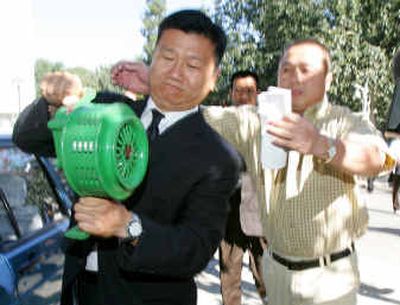China permits anti-Japan rally

BEIJING – China allowed a brief protest outside the Japanese Embassy and sounded sirens in dozens of cities Saturday to mark the anniversary of Japan’s 1931 invasion amid official unease at Tokyo’s new diplomatic and military ambitions.
The official commemorations were the biggest to date and come at a time of rising anti-Japanese sentiment, stoked by a communist government that regards Japan as its rival for regional superpower status.
In Beijing, police let 20 protesters gather outside the Japanese Embassy. The demonstrators held banners opposing Tokyo’s bid for a permanent seat on the U.N. Security Council and its claim to a disputed island chain.
“The Chinese people who have fully suffered the wounds of Japanese militarism must strain every nerve to be vigilant!” one protester, Zhang Jianyong, said through a loudspeaker.
Zhang sounded a hand-cranked siren at 9:18 a.m. – a time representing the Sept. 18 date of the 1931 invasion – but it was quickly confiscated by police.
Sirens sounded in a dozen cities in China’s northeast, the official Xinhua News Agency reported. The government said similar events were planned in more than 100 cities.
The 1931 attack on the northeastern city of Shenyang, then known as Mukden, led to the Japanese occupation of China’s northeast. That was followed in 1937 by the occupation of much of China that lasted until Tokyo’s 1945 surrender at the end of World War II.
Many Chinese resent what they regard as Japan’s failure to atone for its aggression and millions of Chinese deaths.
The communist government keeps alive memories of the “Mukden Incident” through state media and schoolbooks and uses the date to rally nationalism. It was designated “National Defense Education Day” four years ago, opening the way for formal commemorations.
State media called on participants to chant, “Do not forget national humiliation!”
Chinese nationalism, especially among the young, has surged alongside the country’s economy and international influence.
During the recent Asian Cup soccer tournament in China, fans booed during the Japanese national anthem, displayed anti-Japanese signs and attacked the team’s bus.